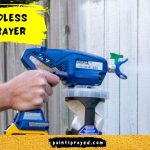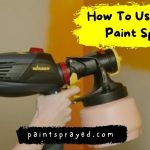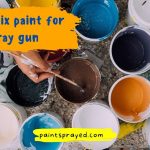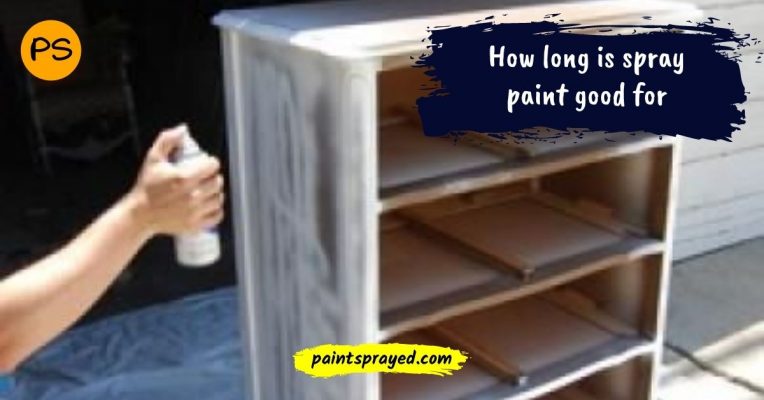There are various ways of spraying candy paint and I want to share some ways with you peeps that I have found the easiest in the long run.
The spray can method doesn’t use many materials and can really save you time in finishing your project.
So it’s a good one to start with but if time is an issue, the second method might be better suited for you.
Candy paint jobs are a unique way of customizing vehicles and motorcycles.
Most standard auto-paints don’t provide the smooth finish desired for these sorts of colorful projects.
So what garages with customers who want to upgrade and customize their ride use are candy paint.
Candy paints are much easier to apply when working in a well-set-up, climate-controlled paint booth that doesn’t allow prying eyes.
When painting your vehicle or motorcycle out of the garage or anywhere else you have to accelerate the delivery time of candy paint to counter the effects of weathering.
Otherwise, paint preparation can be an incredibly arduous task that leads nowhere good.
How to spray candy paint?
Prepare the surface
For candy-coat paint applications, the preparation process isn’t much different from regular paint.
Start with a standard scouring pad to lightly prepare the surface and then clean everything properly.
It’s important to thoroughly clean the surface because any dirt or imperfections in the undercoat will be reflected in the top coat.
Once you’ve cleaned it all up, ensure that you have enough layers because an early mistake can be hard to correct without stripping it all down and starting over once again.
Spray base coat
It’s best to start off with a good base coat when painting, especially if you happen to be planning out your own car painting project.
Not all bases are created equal and what works for one situation may not work for another. If that happens, you could have some real problems on your hands that require special attention.
It’s always best to go from the back end of a problem, relying on the information you already know and then taking it from there.
Apply candy coat
Covering or coating a vehicle in candy requires some serious attention to detail and can be quite difficult depending on the type of candy you’re using.
I suggest keeping first spraying the car with any color you want in the base layer, and then spraying the tan-colored candy over this mid-coat.
It is vital that you cover or coat your vehicle with plastic wrap while making sure not to touch the car itself by using latex gloves.
Or by wearing a smock to avoid getting fingerprints onto your newly applied layers.
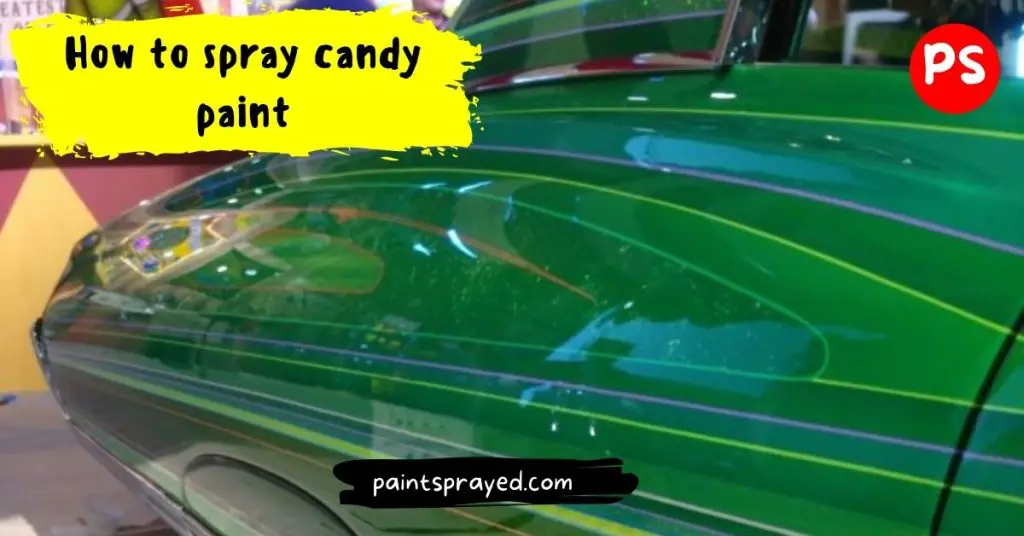
Also, putting on plastic goggles would also be a great idea as this will help reduce/eliminate eye irritation from any paint fumes.
While coating your vehicle make sure you give yourself plenty of time for drying because washing off previous layers is hard work!
Make sure to tell someone where you’ll be before beginning so they don’t get worried about your absence if things take longer than expected!
Apply the top clear coat
After using a tack cloth to remove any pieces of dust or other contaminants from the paint surface, use a clear top coat to seal in the candy paint.
After three coats are applied, you will be left with plenty of room to work without worrying about harming your clear coat.
Sand and buff the surface
Sanding clear coat with 1000-grit wet/dry sandpaper with water, followed by 1500-grit sanding with water will give you a nice smooth finish.
Keep following up on the shine of your paint job by rubbing it down with a little polishing compound on an orbital buffer to get rid of any last imperfections.
That might still be visible so you can reach the perfect shine!
How do you spray house of Kolor Kandy paint?
and equipment. Here is a general outline of the process:
- Prepare the surface: The surface should be clean, dry, and free of any contaminants. Sand the surface with 320-grit sandpaper to create a smooth, even finish.
- Mix the paint: Follow the manufacturer’s instructions for mixing the paint. Be sure to mix the paint thoroughly to ensure a consistent finish.
- Thin the paint: Kandy paint is thick and must be thinned with a special thinner before it can be sprayed. Follow the manufacturer’s recommendations for the proper ratio of paint to thinner.
- Set up your spray equipment: Use a high-quality, gravity-fed spray gun with a 1.4-1.8mm nozzle to apply the paint. Set the pressure at 25-30 psi for the base coat and 30-35 psi for the kandy coat.
- Test the spray pattern: Test the spray pattern on a piece of cardboard or scrap metal to make sure it is even and consistent. Adjust the pressure and distance as needed.
- Apply the base coat: Begin by spraying the base coat using a back-and-forth motion. Keep the gun moving to avoid drips and runs. Allow the base coat to dry according to the manufacturer’s recommendations.
- Apply the kandy coat: Follow the same procedure as the base coat, using a light, even coat of kandy paint. Allow the paint to dry according to the manufacturer’s recommendations before applying additional coats.
- Finish with a clear coat: Once the Kandy coat is dry, apply a clear coat to protect the finish and give it a deep, glossy appearance.
It is important to follow the manufacturer’s instructions and use proper safety equipment when spraying House of Kolor Kandy paint.
If you are not experienced in painting, it is recommended to seek the assistance of a professional.
How many clear coats for candy paint?
It is generally recommended to apply 2-3 coats of clear coat over a candy paint finish. This will help to protect the paint and give it a deep, glossy appearance.
When applying a clear coat over candy paint, it is important to use light, even coats and allow each coat to dry according to the manufacturer’s recommendations.
Before applying the next coat. It is also a good idea to sand the surface with fine-grit sandpaper (1500-2000 grit) between coats to remove any imperfections and create a smooth, even finish.
It is important to follow the manufacturer’s instructions and use proper safety equipment when applying a clear coat.
If you are not experienced in painting, it is recommended to seek the assistance of a professional.
How do you mix candy paint?
To mix candy paint, you will need the following items:
- A base coat of paint
- Candy paint pigment
- A mixing cup
- A stir stick
Here is a simple process for mixing candy paint:
- Pour the base coat of paint into the mixing cup.
- Add the candy paint pigment to the base coat, according to the desired color intensity. The amount of pigment you add will depend on the brand and type of paint you are using, so be sure to follow the manufacturer’s recommendations.
- Mix the paint thoroughly using the stir stick. Be sure to scrape the sides and bottom of the mixing cup to ensure that all the pigment is fully incorporated into the base coat.
- Once the paint is fully mixed, it is ready to be applied to your surface. Be sure to apply the paint in thin, even coats, allowing each coat to dry completely before applying the next.
It is important to note that candy paint can be difficult to work with, as it requires precise mixing and application.
If you are not experienced with using candy paint, it may be best to seek the assistance of a professional painter.
How do you use candy spray?
Candy spray is a type of edible spray that can be used to add a sweet and flavorful coating to a variety of foods, such as fruit, cakes, pastries, and other desserts.
To use candy spray, you will need to shake the can well before use and then hold it about 6-8 inches away from the food you want to coat.
Aim the nozzle at the food and apply a light, even coating of the spray. You can also use a back-and-forth motion to evenly distribute the spray.
It’s important to use candy spray in a well-ventilated area, as the mist can be quite fine and may cause respiratory irritation if inhaled.
You should also avoid getting the spray in your eyes or on your skin, as it can be sticky and difficult to remove.
FAQ’s of How to spray candy paint
Conclusion of How to spray candy paint
Here is the complete guide on painting candy paint with a sprayer on your desired surface.
This step-by-step guide will help you out in painting the surface without creating any mess around the surface or on the surface.
Comment down your queries that need to be fixed right away from me or from my team members.

Matthew Edward is a professional painter who loves to paint and wants to share useful tips and tricks which he had learned in many years of experience in painting. He also used many products that can be used for painting he has tried and tested each and every product to give an unbias opinion about it in his review. This blog is very useful for those newbies who want to learn painting without making mistakes.

